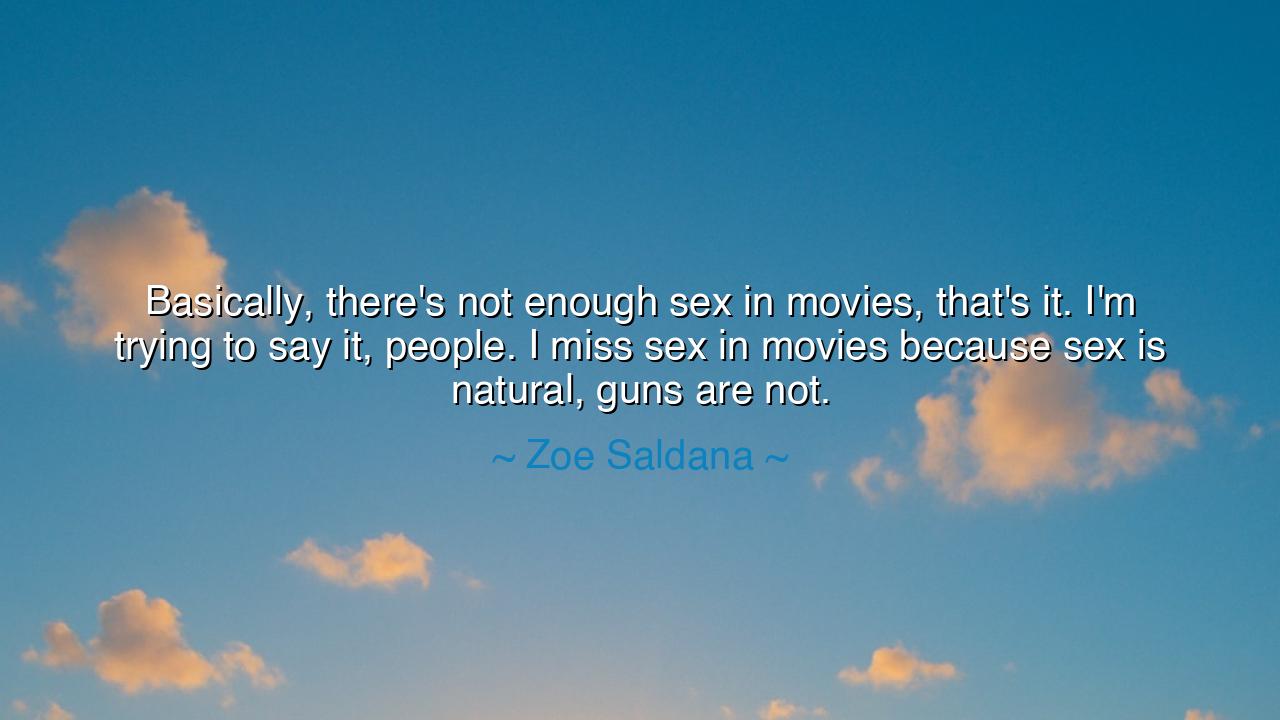
Basically, there's not enough sex in movies, that's it. I'm
Basically, there's not enough sex in movies, that's it. I'm trying to say it, people. I miss sex in movies because sex is natural, guns are not.






Hear the voice of Zoe Saldana, warrior of the screen who has walked among galaxies and danced with legends. She proclaims: “Basically, there’s not enough sex in movies, that’s it. I’m trying to say it, people. I miss sex in movies because sex is natural, guns are not.” These words, though bold and direct, strike to the heart of a deeper truth: that the stories we tell have turned from the celebration of life and intimacy toward the worship of violence, and in doing so, they have forgotten something elemental, something sacred.
For what is sex, but the ancient rhythm of creation itself? It is the bond of love, the spark of joy, the union that brings forth new generations. It is a language older than words, shared across all peoples, all times. And yet, in the halls of cinema, where once it was depicted with tenderness, longing, or even laughter, it has grown rare, replaced by the roar of guns, the spectacle of blood, and the glorification of destruction. Saldana laments not simply the absence of sensuality, but the absence of human truth in a world that chooses to show death over life.
The origin of her words lies in the shifting tides of Hollywood itself. In earlier decades, films often dared to explore passion, desire, and intimacy. Think of Last Tango in Paris, Body Heat, or the playful romances that mingled with sensuality in the golden age. But as the years passed, cultural fears and commercial demands reshaped the screen. Guns became more acceptable than caresses, explosions easier to sell than intimacy. Thus Saldana’s cry is both personal and cultural: she longs for films that remember the natural while questioning why the unnatural—violence—is now given greater space in the stories we share.
History itself confirms this truth. In ancient Greece, the stage gave room for eros as well as war. The myths of Aphrodite and Dionysus celebrated love, beauty, and union, while the tales of Ares spoke of bloodshed. Both forces were honored, but always in balance. When one was exalted above the other—when war consumed and desire was forgotten—civilization lost its harmony. So too in Rome, where gladiatorial combat overshadowed the sacred rituals of family, the empire marched toward decay. In Saldana’s words, we hear the echo of those ancient lessons: when we choose guns over sex, death over life, destruction over creation, we drift into imbalance.
Yet her statement is not merely complaint—it is a call. She asks us to remember that sex is natural. To show tenderness, desire, and human connection on screen is not corruption, but reflection of life itself. To saturate the screen with guns, however, is to feed generations on a diet of violence that does not belong to their deepest nature. For no child is born with a weapon in hand, but every child is born of love’s embrace, whether tender or fleeting. In this, Saldana speaks a truth that rises above art into philosophy: creation is more sacred than destruction.
Beloved listener, take this lesson into your own days. Ask yourself: what stories do you consume, and what stories do you tell? Do they glorify death, or do they honor life? Do you nurture the natural bonds of love and intimacy, or do you grow accustomed only to the spectacle of force? To live well is to keep balance, to embrace passion without shame and to reject the lie that violence is more acceptable than tenderness.
Therefore, let us heed her words as wisdom. Demand stories that honor our humanity, not merely our brutality. Speak openly of love and intimacy, and do not allow them to be silenced while the noise of guns grows louder. In your life, do not shy away from the natural gifts of affection, connection, and desire, for these are the treasures that sustain the soul. Remember always: creation is the highest act, and to honor it is to live in harmony with what we truly are.
Thus Zoe Saldana’s bold cry is not just about cinema—it is about civilization itself. She reminds us that what we glorify shapes who we become. Choose life over death, passion over violence, intimacy over emptiness. For in the end, sex is natural, guns are not—and the stories we tell should remember this eternal truth.






AAdministratorAdministrator
Welcome, honored guests. Please leave a comment, we will respond soon